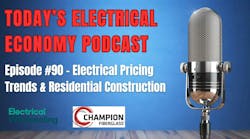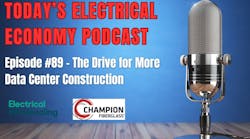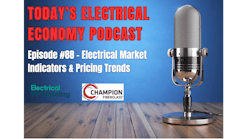There are few words to adequately describe the economic nightmare in the overall economy and fewer still to describe its impact on the electrical wholesale industry. I am not very good at cheerleading so here is the reality as I see it.
I don't think anyone has pegged when there will be a ray of sunshine. Ben Bernanke, chairman of the Federal Reserve recently said he thinks we could see some relief by the end of this year. I can't dispute his view and hope he is correct, but I don't see much relief for the electrical industry until the second half of 2010. There is a big difference between a bottom to the overall economic cycle and the bottom in the electrical industry cycle.
Given that this is still the first quarter of 2009, we have a long way to go. The main issue with the current climate for the electrical industry — and I am including all levels of business: vendors, reps and distributors — is that there is no luxury of error.
In the best of times errors of business judgment can be made with few consequences on business performance. That's not the case in times like these, when errors in resource allocation, business decisions regarding customers, pricing and investments made or not made have a much greater impact or consequence on your business, both in the short term and longer term.
It's always true that cooler heads will prevail and clear thinkers will make better decisions. The problem is that decision makers don't know in advance if their choices are the best or the correct ones. The answer always comes after the fact. You need to have as much information as possible to make the best business judgments you can possibly make. While it's important to listen to your people for their input, really good managers know when to take their employees' advice and when not to take it. The buck always stops with you.
I don't want to dwell on everything you have read or heard from other commentators on the overall economy. The system is broken and it needs to be fixed, starting with the banking sector. The fiscal package will not be as stimulative without a fully functioning banking system.
Then there is the issue of whether the stimulus package is large enough. Everyone has weighed in and it seems many economists do not think it is enough. It is also not useful to debate what to call this downturn. A recession? A depression? A great recession? It doesn't matter. What does matter is how far down the economy goes and how bad it gets. To steer your business through this business cycle you need to know how far down the overall electrical market will go so you can develop the proper business strategies to protect your bottom line. Profits are important, but even more important is making sure you have enough cash to pay your bills so you can stay afloat through this crisis.
It would be nice if we could expect to get a boost from existing known sources, like the fiscal/monetary stimulus package. Whether it is enough or not, it will not kick in this year or have much if any impact on your business in 2009. Don't expect any help from the government or positive help from a strengthening economy this year. It's all about increasing aggregate demand and we do not expect aggregate demand to increase in 2009.
The other potential source to increase aggregate demand is foreign markets, but the rest of the world is in as much economic trouble as we are. That means electrical distributors, independent manufacturers' reps, electrical manufacturers and end users will have to survive as best they can as individual businesses.
Here is the crucial issue. How do you manage your resources when your industry is falling at a 20 percent or better rate from year-ago sales? A 20 percent decline is the very best forecast I can offer in terms of optimism. At this point we are thinking more on the order of 25 percent to 30 percent.
Companies I have talked with began to hit the wall around November of last year and that decline is carrying through the current period. More fortunate companies didn't begin their slide until the beginning of the year, but almost everyone is experiencing the pain now, some more than others.
I wish I could promise you magic from my crystal ball, but there is no magic and the crystal ball is unfortunately very clear. What we see for the remainder of 2009 is double-digit declines in industry sales in each quarter. With a dearth of construction and limited investment in OEM/MRO operations, there will be limited demand for electrical supplies and apparatus. One source of possible demand is public expenditures. While they may provide legitimate opportunities, in the past they have never been a really big driver of demand for electrical products. This doesn't mean they should not be a target for you.
Here is the bottom line as I see it, as painful as it is: We are going to go from an industry that sold approximately $73 billion of electrical supplies in 2008 to an industry that will sell not more than approximately $55 billion in 2009. You can do the math and calculate how far down is “down” this year for your company.
Herm Isenstein is president of DISC Corp., Orange, Conn. the leading industry forecasting company in the electrical business. He can be reached at (203) 799-3673 or by email at [email protected].
Leading Indicators to Watch in the Electrical Market
Here are five indicators that may help you prepare for future economic activity in the electrical industry.
EBCI jumps 15.6 points in March
The Electroindustry Business Confidence Index (EBCI) for future North American conditions posted a sizable gain in March, jumping 15.6 points from February to 52 points. That performance marked the index's first foray above the 50-point growth threshold since August 2007. The EBCI is a monthly survey of electrical manufacturers published by the National Electrical Manufacturers Association (NEMA), Rosslyn, Va.
Purchasing Managers Index (PMI) up 0.2 points in February
While purchasing managers surveyed by the Institute for Supply Management, Tempe Ariz., were generally pessimistic about chances for recovery in 2009, the PMI crept up a fraction of a percent in February to 35.8 points, still well below the growth threshold. A reading above 50 percent indicates the manufacturing economy is generally expanding.
February building permits rise 3 percent over soft January number
The U.S. Census Bureau says privately-owned housing units authorized by building permits in February were at a seasonally adjusted annual rate of 547,000, a three percent increase over the revised January rate of 531,000, but 44.2 percent below the revised February 2008 estimate of 981,000.
Architecture Billings Index (ABI) up two points in February
Following another historic low score in January, the ABI was up two points in February. The ABI reflects the approximate nine- to 12-month lag time between architecture billings and construction spending. The American Institute of Architects (AIA) reported the February ABI rating was 35.3 points, up from the 33.3-point mark in January, but still pointing to a general lack of demand for design services (any score above 50 indicates an increase in billings).
Conference Board's Leading Economic Index (LEI) drops 0.4 percent in February
The LEI for the U.S. declined 0.4 percent in February, following a 0.1 percent increase in January, and a 0.1 percent decline in December. The Conference Board sees growth in 2010. — Jim Lucy, Electrical Wholesaling








